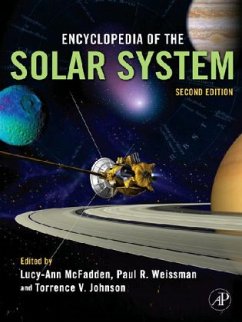Long before Galileo published his discoveries about Jupiter, lunar craters, and the Milky Way in the Starry Messenger in 1610, people were fascinated with the planets and stars around them. That interest continues today, and scientists are making new discoveries at an astounding rate. Ancient lake beds on Mars, robotic spacecraft missions, and new definitions of planets now dominate the news. How can you take it all in? Start with the new Encyclopedia of the Solar System, Second Edition.This self-contained reference follows the trail blazed by the bestselling first edition. It provides a framework for understanding the origin and evolution of the solar system, historical discoveries, and details about planetary bodies and how they interact-and has jumped light years ahead in terms of new information and visual impact. Offering more than 50% new material, the Encyclopedia includes the latest explorations and observations, hundreds of new color digital images and illustrations, and more than 1,000 pages. It stands alone as the definitive work in this field, and will serve as a modern messenger of scientific discovery and provide a look into the future of our solar system.
"Encyclopedia of the Solar System, as a title, is almost on a par with The Hitchhiker's Guide to the Galaxy and, come to the think of it, the content is almost as mind-blowing."
-Satellite Evolution Group, September 2007
"The editors have brought together an awesome amount of information authored by a Who's Who of planetary science."
-Sky and Telescope, July 2007
"The book is a delight to hold and view, printed in glorious colour on quality paper. This is one of those books you just have to own. ...The editors of this work have made a commitment to keep it current... It is a tome I would recommend to any with a love of information on our neighborhood -- the Solar System."
--David O'Driscoll, AAQ Nesletter
"Everything you want to know about the solar system is here. Let your fingers be the spacecraft as you thumb through this book visiting all the planets, moons and other small objects in the solar system. This is the perfect reference book, lavishly illustrated and well-written. The editors and authors have done a magnificent job."
-From the Foreword by WESLEY T. HUNTRESS, JR., Geophysical Laboratory, Carnegie Institute of Washington
"The Encyclopedia offers remarkably clear descriptions of the diverse objects that comprise the solar system. The authors succeed brilliantly at combining the latest results from spacecraft missions and Earth-based observations with thoughtful interpretations of the processes that have shaped solar system evolution."
-MARIA T. ZUBER, E.A. Griswold Professor of Geophysics, Massachusetts Institute of Technology
"I expect members of the planetary science community will use this book to brush up on subjects outside their own specialty. This book reminds me how rapidly planetary science is evolving. This second edition comes at the right time."
-ANDREW P. INGERSOLL, Professor of Planetary Science, California Institute of Technology
"The editors and authors are scientists whose knowledge I trust. The addition of color in this new edition not only makes the book more attractive but also adds appropriate clarity in suitable places. The level of mathematics and detail in the entries makes them suitable for graduate students and researchers and for advanced undergraduate courses."
-JAY M. PASACHOFF, Field Memorial Professor of Astronomy, Williams College
"The second edition of this valuable encyclopedia comes with wonderfully updated and spectacular spacecraft images, from Mars to Callisto and beyond. It's a great primer for students as well as a reference for professionals."
-WILLIAM K. HARTMANN, Senior Scientist, Planetary Science Institute
-Satellite Evolution Group, September 2007
"The editors have brought together an awesome amount of information authored by a Who's Who of planetary science."
-Sky and Telescope, July 2007
"The book is a delight to hold and view, printed in glorious colour on quality paper. This is one of those books you just have to own. ...The editors of this work have made a commitment to keep it current... It is a tome I would recommend to any with a love of information on our neighborhood -- the Solar System."
--David O'Driscoll, AAQ Nesletter
"Everything you want to know about the solar system is here. Let your fingers be the spacecraft as you thumb through this book visiting all the planets, moons and other small objects in the solar system. This is the perfect reference book, lavishly illustrated and well-written. The editors and authors have done a magnificent job."
-From the Foreword by WESLEY T. HUNTRESS, JR., Geophysical Laboratory, Carnegie Institute of Washington
"The Encyclopedia offers remarkably clear descriptions of the diverse objects that comprise the solar system. The authors succeed brilliantly at combining the latest results from spacecraft missions and Earth-based observations with thoughtful interpretations of the processes that have shaped solar system evolution."
-MARIA T. ZUBER, E.A. Griswold Professor of Geophysics, Massachusetts Institute of Technology
"I expect members of the planetary science community will use this book to brush up on subjects outside their own specialty. This book reminds me how rapidly planetary science is evolving. This second edition comes at the right time."
-ANDREW P. INGERSOLL, Professor of Planetary Science, California Institute of Technology
"The editors and authors are scientists whose knowledge I trust. The addition of color in this new edition not only makes the book more attractive but also adds appropriate clarity in suitable places. The level of mathematics and detail in the entries makes them suitable for graduate students and researchers and for advanced undergraduate courses."
-JAY M. PASACHOFF, Field Memorial Professor of Astronomy, Williams College
"The second edition of this valuable encyclopedia comes with wonderfully updated and spectacular spacecraft images, from Mars to Callisto and beyond. It's a great primer for students as well as a reference for professionals."
-WILLIAM K. HARTMANN, Senior Scientist, Planetary Science Institute

